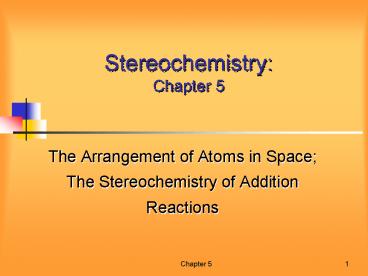Stereochemistry: Chapter 5 - PowerPoint PPT Presentation
1 / 41
Title:
Stereochemistry: Chapter 5
Description:
Any object that has a plane or point of symmetry is achiral (not chiral). Chapter 5 ... Topology of Stereoisomers With Two Chiral Centers. Chapter 5. 27 ... – PowerPoint PPT presentation
Number of Views:186
Avg rating:3.0/5.0
Title: Stereochemistry: Chapter 5
1
Stereochemistry Chapter 5
- The Arrangement of Atoms in Space The
Stereochemistry of Addition Reactions
2
Contents of Chapter 5
- Conformational and Configurational Isomers
- Chirality Centers, Enantiomers
- Optical Rotation, Optical Purity
- Isomers with More Than One Chirality Center
- Separation of Enantiomers
- Reactions of Chiral Compounds
- Absolute Configurations
- Stereochemistry of Reactions
3
Kinds of Isomers
4
Conformational Isomers
5
Configurational Isomers Cis-Trans Diastereomers
6
Isomers with One Chirality Center
A chirality center arises when four different
substituents are bonded to a carbon
Only two isomers are possible, an R isomer and an
S isomer.
7
Chirality
- R and S enantiomers are mirror images of each
other, just as your right hand is the mirror
image of your left hand
8
Chirality
- Any object that has a plane or point of symmetry
is achiral (not chiral).
9
Examples
10
Mirror Trick
Whenever two structures can be positioned around
a symmetry plane if they arent identical theyre
enantiomers.
11
Drawing Enantiomers
Fischer Projections
N and S are down into plane, E and W are up out
of plane of page or screen.
12
Naming Enantiomers The R,S System of Nomenclature
- Rank groups by atomic number of the atom bonded
to the chirality center. Use the same system
that was used for the E and Z isomers of alkenes
13
Naming Enantiomers The R,S System of Nomenclature
- Orient molecule so that group (or atom) of lowest
priority is directed into plane. - 3. Draw a curve from group of highest priority
through the group of second priority to group of
third priority
14
Naming Enantiomers The R,S System of Nomenclature
- R (Latin rectus) right turn
- S (Latin sinister) left turn
15
Swap Trick
- If for any reason you ever wish a group were in a
different position simply swap it with another
group. - Swap simply reverses the chirality.
R for switched compound implies S for actual
compound
16
Low Priority Group Up Trick
- If the low priority group in figure points up
rather than down simply draw circular arrow and
reverse chirality.
- R for reversed chirality implies S for actual
chirality
17
Fischer Tricks
- If low priority group on vertical line (into
plane) draw normal rotating arrow. - If low priority group on horizontal line draw
rotating arrow and reverse the R or S result. - Rule of thumb If group 4 is Vertical, Very true.
If group 4 is Horizontal, Horribly wrong.
18
Fischer Tricks
- 90º rotation reverses all chiralities.
- 180º rotation maintains all chiralities.
19
Multi-Carbon Fischer Trick
- Can rotate 3 groups either CW or CCW without
changing configuration - If 3 grps have same rel CW or CCW sequence Cs
same
20
Newman Projections
- For front C swap low priority group to back C
- If swap was necessary curved arrow now gives
reversed chirality otherwise correct
21
Newman Projections
- For back C swap low priority group to front C
- If swap was necessary curved arrow now gives
correct chirality otherwise reversed
22
Compounds with More Than One Chirality Center
- Two Pairs of Similar Groups
23
Compounds with More Than One Chirality Center
- Three Pairs of Similar Groups
24
Meso Compounds
25
Drill on Meso CompoundsProblem 27
- Does the following compound have a stereoisomer
that is a meso compound?
Plane of symmetry
Meso form possible
26
Topology of Stereoisomers With Two Chiral Centers
27
R,S System for Isomers with More Than One
Chirality Center
- Compound is (2S,3R)-3-bromo-2-butanol
28
R,S System for isomers with more than one
Chirality Center
- Compound is (2S,3R)-3-bromo-2-butanol
29
Relative and Absolute Configurations
- () amphetamine is known to have the R-
configuration - Therefore the () form has S configuration
30
Separation of Enantiomers
- Racemic lactic acid can be reacted with a
naturally occurring chiral base, such as morphine
or strychnine - The product is a pair of diastereomers
- Properties of diastereomers are sufficiently
different from each other to allow separation - After separation, each diastereomer can be
reacted with hydrochloric acid, yielding an
optically pure R or S acid
31
Enantiotopic, Diastereotopic, and Homotopic
Hydrogens
32
Enantiotopic, Diastereotopic, and Homotopic
Hydrogens
33
Regioselective, Stereoselective, and
Stereospecific Reactions
- A regioselective reaction is one in which
multiple constitutional isomers possible, but
more of some formed than others.
34
Regioselective, Stereoselective, and
Stereospecific Reactions
- A stereoselective reaction can produce multiple
stereoisomers theoretically, but more of some
produced than others.
35
Regioselective, Stereoselective, and
Stereospecific Reactions
- A stereospecific reaction produces different
stereoisomer products from different stereoisomer
reactants.
36
Syn Addition
- When the two substituents add to the same side
- Addition of H2 is a syn addition
37
Anti Addition
- When the two substituents add to opposite sides
38
Stereochemistry of Addition
CIS-SYN-ERYTHRO RULE
- Unmodified only works for addition of X2
- For addition of XY use to calculate X eclipses Y
or X opposite to Y in Fischer projection.
39
Stereochemistry of Addition
Cis-Syn-Erythro Example
40
Stereochemistry of Addition
Pro-Fischer Analysis
41
Stereochemistry of Addition
Pro-Fischer Analysis Example































